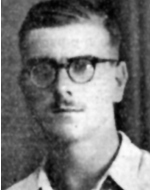Stahl, Raphael (Ralph, Linko)
Son of-Frida-Zippora and Dr. Herman (Zvi) was born on June 2, 2626 in Berlin, the capital of Germany, to a family rooted in Judaism and raised in a Zionist atmosphere. In October 1934, the family immigrated to Israel and he and his brother and sister began to study at the Herzliya Gymnasium in Tel Aviv, where he was nicknamed “Linko” by his friends. With his diligence and studies, he surpassed almost all his friends, and especially excelled in his real studies. Before the matriculation exams, groups of students gathered around him to use his knowledge. He read in three languages: Hebrew, English and German – in philosophy, history, economics, and fine literature, and formulated his own opinions with objective criticism and logical consideration. Raphael loved the chess game, trips and visits to the plays, and the young scholar, the life-loving young man, and the man of duty and responsibility merged with him. Was confined to himself and settled for a small circle of friends. While he himself refrained from addressing anyone with a request, he responded to everyone who turned to him. When he was in sixth grade he joined the Haganah and fulfilled his obligation with dedication and enthusiasm. After the matriculation exams, he went on a year of service in Notarot Hashahar. At the end of the year he stayed for another year. He completed a course for battalion commanders in the army, returned to the elite in Ayelet Hashahar and rose to the rank of corporal. After completing his second year of tutoring, he began studying mathematics and physics at the Hebrew University of Jerusalem and at the beginning of the first and second years he was awarded the scholarship. He made a living from his savings from salary and tutoring, so that he would not need the help of his parents. Immediately after the UN General Assembly resolution on November 29, 1947, the partition of the country and the outbreak of the War of Independence, he took up active duty in the Haganah, was the commander of a class of students in the Moriah Battalion and stood guard in Rehavia, Talbieh and Motza. Faithfully and with no argument, but in private letters he criticized the phenomena of the civil and military leadership that he did not approve of, out of patriotic concern for the fate of the city and the homeland. Beit Horon, which was established at that time and was instructed to train the recruits brought in convoys from the coastal plain and Esau Soldiers from the right. Before Passover he went with his students to combat service in the mountains, on the way to the coastal plain. Recently, he was with them at the radar station occupied by our forces near Maaleh Hahamisha, where he fell, while the Legion forces returned and conquered the radar, on the day of the 17th of Iyar 5708 (May 26, 1948). On the 17th of Cheshvan 5710 (17.11.1949) he was laid to rest at the military cemetery on Mount Herzl in Jerusalem.
